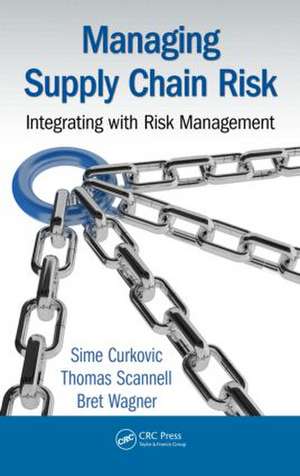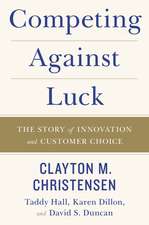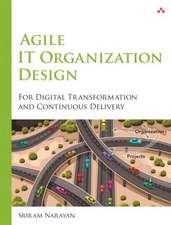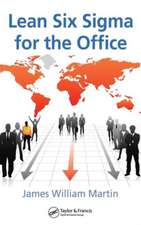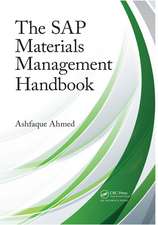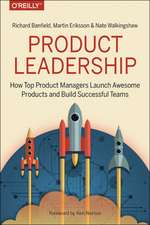Managing Supply Chain Risk: Integrating with Risk Management
Autor Sime Curkovic, Thomas Scannell, Bret Wagneren Limba Engleză Hardback – 24 iun 2015
The book focuses on the structure, implementation, and maintenance of a formal system for managing risks in the supply chain. Using data from firms and supply chain managers, the authors identify which factors have a critical impact on the decision to develop a system for managing supply chain risks and also explain how these factors can influence the level of success. They then detail how you can leverage these factors into a competitive advantage.
However, the success of your supply chain risk management integration requires more than simply creating a new program or department. This major undertaking does not happen in a vacuum, rather it is a response to a number of factors or influences. And these factors can act to pre-condition the firm and its systems to the introduction and acceptance of, and progress on managing supply chain risks. Yet, no book has empirically identified these factors and explained how you can overcome resistance and make managing risks an integral part of your supply chain management. Until now.
Preț: 615.12 lei
Preț vechi: 723.67 lei
-15% Nou
Puncte Express: 923
Preț estimativ în valută:
117.70€ • 123.22$ • 97.39£
117.70€ • 123.22$ • 97.39£
Carte tipărită la comandă
Livrare economică 05-19 aprilie
Preluare comenzi: 021 569.72.76
Specificații
ISBN-13: 9781498707107
ISBN-10: 1498707106
Pagini: 262
Ilustrații: 21 black & white illustrations, 92 black & white tables
Dimensiuni: 156 x 234 x 20 mm
Greutate: 0.5 kg
Ediția:1
Editura: Taylor & Francis
Colecția CRC Press
Locul publicării:Oxford, United Kingdom
ISBN-10: 1498707106
Pagini: 262
Ilustrații: 21 black & white illustrations, 92 black & white tables
Dimensiuni: 156 x 234 x 20 mm
Greutate: 0.5 kg
Ediția:1
Editura: Taylor & Francis
Colecția CRC Press
Locul publicării:Oxford, United Kingdom
Public țintă
Professional Practice & DevelopmentCuprins
Introduction. An overview of supply chain risk management. Corporate strategy. Supply chain organization. Process management. Performance metrics. Information and technology. Supply chain risk management in conjunction with other risk management applications. Utilizing COSO’s Enterprise Risk Management Framework. Utilizing FMEA. Utilizing ISO 31000:2009. How Steelcase took control of supply risk. Appendix.
Notă biografică
Dr. Sime Curkovic is a Professor of Supply Chain Management at Western Michigan University. He received his undergraduate degree in Management Systems from Kettering University and his Ph.D. degree from Michigan State University. Dr. Curkovic has taught several courses in sourcing, operations, logistics, process, environmental, and multinational management. His research interests include environmentally responsible manufacturing, green purchasing, total quality management, supply chain management, and integrated global strategic sourcing. Dr. Curkovic's publications have appeared in the Journal of Supply Chain Management, the IEEE Transactions on Engineering Management, the Decision Sciences Journal, the International Journal of Operations and Production Management, the International Journal of Production Research, the Journal of Quality Management, the Journal of Operations Management, and the International Journal of Production Economics. His professional memberships include ASQ, APICS, DSI, INFORMS, ISM, and POMS. Dr. Curkovic's previous work experiences were with General Motors in the midwest, Mexico, and Germany. His dissertation on the relationship between Total Quality Management and Environmentally Responsible Manufacturing has been given the following awards: 1) The APICS Educational Foundation Edward & Marion Plossl Fellowship; 2) The Richard J. Lewis Quality of Excellence Award; and 3) The National Decision Sciences Institute Buffa Doctoral Dissertation. Dr. Curkovic’s previous research and consulting experiences have been with: Denso, Asmo, Dana, Lear, JCI, Steelcase, Benteler, Kellogg, Stryker, Eaton, Whirlpool, GM, Chrysler, Ford, Harley-Davidson, John Deere, Rolls Royce, Borg Warner, Bosch, Honda, Tektronics, and Cargill. Dr. Curkovic is a born U.S. citizen of Croatian descent.
Bret Wagner is an Associate Professor in the management department. He was director of the ISM program from 2004 to 2012, during which time enrollment in the program increased 79% and the Gartner Group ranked the program #5 in the nation. With a Ph.D. in Operations Management from Michigan State and a Master of Engineering Administration from George Washington University, he brings his strength in Production Planning to the ISM program. His research interests are production planning and scheduling and optimization modeling. Bret has spearheaded the SAP initiative at the College of Business. He has received numerous grants to support the initiative and has helped integrate SAP’s software into the ISM curriculum. He is widely sought to provide workshops on using SAP software in business curriculum. He was the first recipient of the Majdi Najm Service Award from the SAP University Alliance. He is the co-author of the book Concepts in Enterprise Resource Planning and has published research articles in Decision Sciences, International Journal of Operational Research and the Journal of Operations Management.
Bret Wagner is an Associate Professor in the management department. He was director of the ISM program from 2004 to 2012, during which time enrollment in the program increased 79% and the Gartner Group ranked the program #5 in the nation. With a Ph.D. in Operations Management from Michigan State and a Master of Engineering Administration from George Washington University, he brings his strength in Production Planning to the ISM program. His research interests are production planning and scheduling and optimization modeling. Bret has spearheaded the SAP initiative at the College of Business. He has received numerous grants to support the initiative and has helped integrate SAP’s software into the ISM curriculum. He is widely sought to provide workshops on using SAP software in business curriculum. He was the first recipient of the Majdi Najm Service Award from the SAP University Alliance. He is the co-author of the book Concepts in Enterprise Resource Planning and has published research articles in Decision Sciences, International Journal of Operational Research and the Journal of Operations Management.
Descriere
Risk management in supply chain logistics has become a necessity due to the number of variables that could cripple a business. This book gives an overview of the critical factors to be considered when managing supply chain risk, with further discussion of how managing supply chain risk can be integrated into Enterprise Risk Management (ERM) applications, with a focus on the Committee of Sponsoring Organizations (COSO), Failure Mode Effects and Analysis (FMEA), and International Organization of Standards (ISO) 31000:2009 frameworks.
